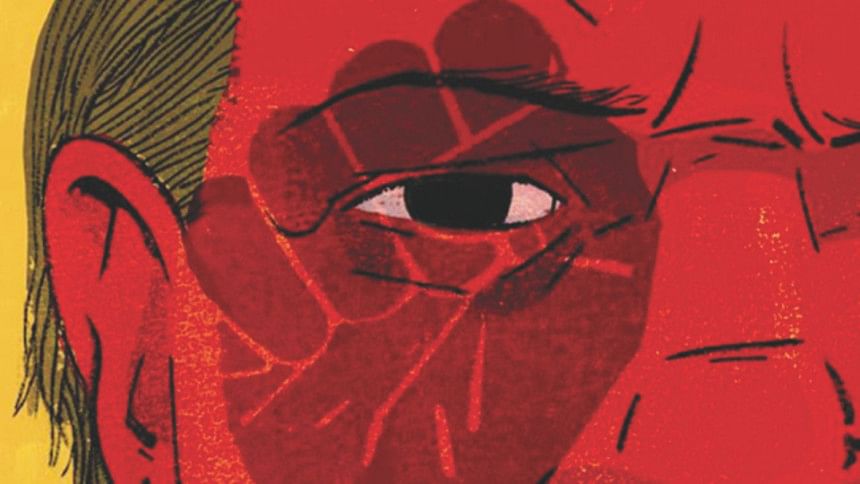Ending violence against women and girls

As this year's 16 days of activism on violence against women draws to a close, it is a good time to reflect on why we need this annual push.
I grew up in a place and time – the UK in the 70s – when equality for women seemed to be fast approaching. Equal pay laws were introduced. Family planning was enabling more women to have careers and economic independence. More women were entering politics - one becoming Prime Minister.
We have read similar stories from across the world in the last few decades. Here in Bangladesh we have seen progress in improving the lives of women and girls, not least by getting as many girls as boys enrolled in primary school and reducing maternal and infant mortality. The Government of Bangladesh has a National Plan of Action for tackling violence against women and girls and has brought in legislation such as the Domestic Violence (Prevention and Protection) Act 2010.
But despite women having more opportunities for education and formal employment, the country still sees high levels of violence against women and girls. More than 80 percent of married Bangladeshi women are abused at least once during their marriage, be it physical, sexual, emotional or financial abuse, and most often from someone they know and should be able to trust. Survivors face severe and life-long physical and mental health problems. Violence and stigma rip apart family life.
If we want to do something for the one in three women and girls around the world who experience violence in their lifetime we need to change minds and behaviours.
It also has a negative economic impact. For example, in 2010 Bangladeshi families experiencing domestic violence spent an average USD 163.50 each to get help, mostly on medical services. The total annual cost borne by households in Bangladesh was estimated in 2010 as 2.1 percent of GDP, or USD 2.4 billion.
If we want to do something for the one in three women and girls around the world who experience violence in their lifetime we need to change minds and behaviours. We need to challenge the lower value placed women and girls, and the discrimination, inequality and sexual and gender-based violence that flows from that.
The 16 days of activism doesn't just put a spotlight on the devastating effects of violence. They highlight what can be achieved if action is taken.
In my few months here I have already met some of the bravest women I have ever come across - women who have escaped terrible violence, rebuilt their lives and are taking a stand. One woman had been badly abused by her husband and then thrown out of her home. Her family had rejected her. With help from a local organisation that UK Aid supports, she was able to get health, skills training and other support for herself and her children, and build a new livelihood rearing livestock. She had done so well that she was employing other women. Newly prosperous, she found her husband and her family wanting her back. She was having none of it. Counselling and financial independence had given her confidence and freedom.
Women's empowerment, and their ability to take up productive work outside the household, is good for the wider world too. It fuels economic growth and reduces poverty. But until we eliminate violence against women and girls, too many of them will be excluded from that.
It is against this backdrop that the UK has recognised the need to raise investment. In announcing at the start of the 16 days of activism an additional 6m pound of UK Aid to eliminate violence against women and girls, the UK's Secretary of State for International Development, Priti Patel said:
"We cannot and will not tolerate any form of violence against women and girls. Britain is leading efforts across 30 countries… from ending female genital mutilation and child marriage to preventing domestic abuse. UK Aid already helps survivors in some of the world's poorest countries – now we are stepping up our global leadership and support to protect even more women and girls and address the root causes of violence".
Here in Bangladesh, tackling violence against women and girls is a top priority for UK Aid. Our focus is to stop violence before it starts, by supporting women's and girls' education, health and economic empowerment, so that girls and women can achieve their full potential.
We also support victims of violence, ensuring they have access to security, justice and health services. Our programmes create job opportunities for survivors, helping them to be reintroduced to society. They give attention to work with men and boys to tackling social norms that result in gender-based violence and early marriage.
Successes include giving more than 45,000 female victims of violence access to medical and /or legal assistance. UK support has arranged more than 11,000 dowry-free marriages and prevented 13,000 early marriages (girls under 18 years). We also supported the Acid Survivors' Foundation to significantly reduce acid violence from a high of 494 recorded attacks affecting 496 victims in 2002 to 59 attacks affecting 74 victims in 2015. This shows that when action is taken with enough energy, change can happen and fast.
As a partner of the Government of Bangladesh, and on the international day marking the importance of Human Rights for all, the UK Government asserts that everyone benefits from ending violence against women and girls, both economically and socially. We look forward to working with our partners here to ensure the end of the 16 days of activism marks the beginning of even more action in the other 349 days of the year.
The writer is Head of DFID-Bangladesh
Twitter: @JaneEdm_DFID

 For all latest news, follow The Daily Star's Google News channel.
For all latest news, follow The Daily Star's Google News channel. 



Comments